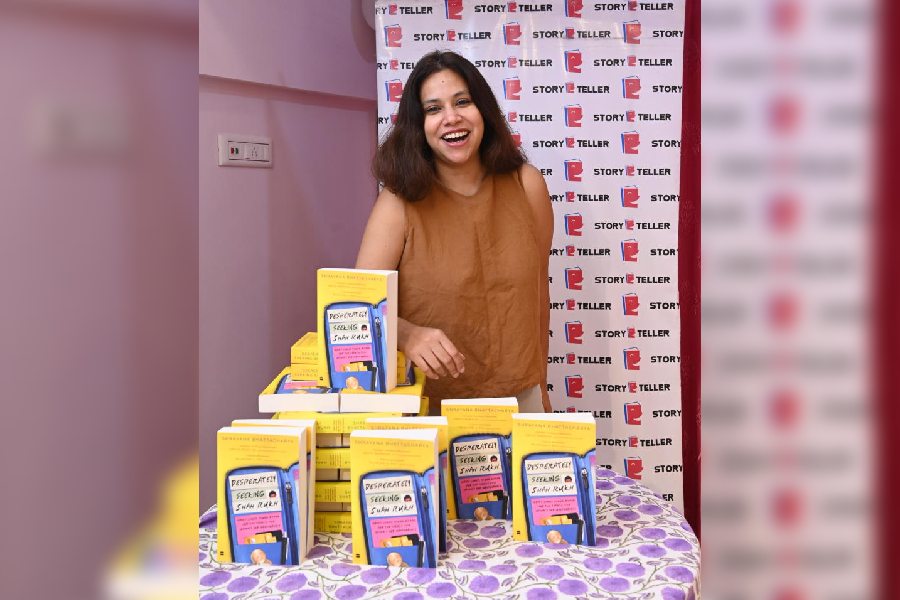Shrayana Bhattacharya, the author of Desperately Seeking Shah Rukh: India’s Lonely Young Women and The Search For Intimacy and Independence, was recently at Storyteller Bookstore in Ballygunge for a book signing evening. The Telegraph caught up with the Harvard University alumnus on SRK, structural social injustices and their notorious impact on Indian women who, to their chagrin, are habituated to gulping down their unrequited desires by just gazing at their favourite superstar on screen.
The title of your book is so alluring.
I have distinctly stated in the book that I can’t comment on SRK as an actor or persona. I’m too biased a fan there. In my book, SRK is a proxy for income, masculinity, money and media. He is my research anchor.
How is he intertwined with such a huge narrative?
The book is never about women chasing a celebrity. The superstar comes as a proxy for purchasing power. The women in my research were struggling for economic independence to be able to afford movie tickets or buy a mobile phone to be able to watch their favourite actor. The book is a commentary on the sorry state of India’s economy for women (from a certain section of society) — they can’t even purchase the iconography of their favourite actor. These women are seeking the money, the public space, the media and the markets. During the first four-five years of my survey, I was surprised that many of these women had started using the actor’s iconography to talk about the men in their own life. In a way, it became a way for them to comment on unhappy/ happy romances, what their ideal version of SRK looked like and their frustrated desire for intimacy. They cannot afford the cinemas, but of course, they remember what was happening in their personal life when they watched Kuch Kuch Hota Hai.
Is SRK a recourse for women for constant companionship?
I was in my early 20s when I started my research. As part of a project for SEWA, I had to survey the working conditions of women garment workers in Ahmedabad. I was deputed as one of the research assistants. With my relevant questions, they were seemingly bored. They said they had already responded to similar surveys before. As an ice-breaking technique, I asked them about their favourite actor. I had always been told that SRK’s fan base was largely urban elites and NRIs, and during the course of my work, I found out India’s working class adored him as much.
Can you tell us a bit more about your research?
This book is based on longitudinal research. It’s like you follow people over a period of time and interview them in fragments. I followed 10 women for over 10 years. It took me 15 years to write this book. The book also combines statistical data and the data are very depressing when it comes to women’s participation in the workforce. My research was predominantly in Jharkhand, UP, Delhi and Gujarat.
How did you end up writing the book?
I was interested in capturing what was happening in these women’s lives, economic and personal. I would keep taking notes. It was around 2011-12 I realised my notes might as well be a substance for a book. Initially, I thought it might be an academic paper.
Why do you think they seek SRK and not any other Khan?
I think there is a vulnerability in the characters he has played on screen. One fangirl’s mother told me she saw a hero peel carrot in a film for the first time (in DDLJ). His films give room for women to speak. He is a story of economic success. The collective motivation is that someone who came without any network has made it big as an outsider. Many of these women in my book were struggling to find their economic feet.
Mr Khan is our first post-liberalisation superstar. A lot of his stories are economic, which connects well with the 1991 reforms. He is a hero of that era and someone who has essentially capitalised on all the gains and technology reforms that era had offered. All these women had grown into adulthood in the early 2000s. The reforms gave them a new lease of life.
Standing in 2023, have things changed for any better?
More women are getting degrees, so that’s a great shift, but the sad part is we are not seeing them entering the labour market as much. Do these women still have more purchasing power or an income of their own? That still looks a long way off.
